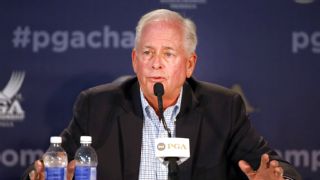|
As a black man raised in an American South saddled with a sordid racial history, I view Ted Bishop's recent chiding of Ian Poulter for criticizing Nick Faldo and Tom Watson as a reminder of the centuries-old demand by white segregationists that African-Americans stay in their place. Bishop's evoking of a "little school girl squealing during recess" to describe Poulter's behavior wielded the imagery of a playground, the kind where many of us were indoctrinated at an early age to perform specific gender roles that would direct the course of our lives. Had Bishop called Poulter a whining little boy, anti-bullying groups likely would have rightfully targeted him. The business of name-calling is full of just liabilities. Bishop is not likely a racist or a sexist, but his words are deeply problematic for a society and a game looking to push past its legacy of exclusion for racial minorities, women and the poor. By ousting Bishop as its president, the PGA of America has held the Indiana club pro accountable for his statements. His tenure as president will be largely remembered for hiring Tom Watson as U.S. Ryder Cup captain, a decision now widely viewed as a mistake, as well as for his insensitive comments aimed at Poulter. Bishop will soon to disappear back to his golf club in Indiana, but the rules on his playground will persist long after this saga is forgotten. In the world that Bishop inhabits, women are not even on the playground. His is a man's world and men don't squeal like little girls in recess, or so he explained to Poulter. Of course, we all knew girls who were just as tough as the boys on the playground. Women are leaders in every phase of society. Bishop knows that. But that fact didn't figure into his calculus about how Poulter should treat his elders within the world of men's golf. "Obviously I could have selected some different ways to express my thoughts on Poulter's remarks," Bishop said last Thursday. "Golf had always been a sport where respect was shown to its icons. That seems to have gone by the wayside."  In other words, I'm sorry that I let my quip about "little girls" distort my message, but I meant what I said. Stay in your place was Bishop's overarching message to Poulter. How dare you criticize two Hall of Famers such as Watson and Faldo? These two great champions don't need defending, but Bishop was the enforcer on the playground, a major carrier of the virtues of the game. He set the rules and determined the etiquette. Ultimately, his remarks are a reminder of a larger point that golf continues to be a deeply stratified sport, where everyone must be acutely aware of their place in the game. Bishop didn't intend to harm women, but he did inadvertently highlight the subordinate role that women still play to men in large swaths of society and in golf. On Tuesday in a Golf Channel interview, Bishop, who has two daughters who work in the golf industry, said that he felt "stupid" about his remarks and that it was "painful" because this mistake could potentially "put down the drain" everything that he has tried to do for women in his tenure as president of the PGA. Still, Bishop's apology and efforts to support women's initiatives in the game won't easily quell a deeply ingrained mentality in golf, sports and the larger society that women are somehow in many ways inferior to men. Firings, public rebukes, sensitivity training sessions and the hiring of more women to leadership positions in the golf industry will not alone produce change. The rules of the playground are too firmly entrenched for this work to happen overnight. If social media was Bishop's undoing, then we ought to be thankful for that medium's intrinsic value for often bringing out the true feelings of people and introducing these important issues to the national spotlight. Perhaps much of the attack on Bishop might be political correctness gone amok. Yet there may be a clear path forward from this moment, a way to elevate the conversation already underway around making the game more accessible to all groups. As much as there are institutional and economic barriers to growth in the game, there is a messaging problem that starts with how the game's leaders talk about the sport. When the PGA of America announced in May that it was awarding two of its championships to Donald Trump-owned golf courses, I asked Bishop if he were concerned about having such a controversial and sometimes racially divisive figure as Trump representing the game and his organization. I reminded Bishop of racially charged comments that the real estate magnate had made about President Obama. Bishop assured me that Trump would not be a problem for the PGA of America. "The Donald Trump that some talk about is a different Donald Trump than the one the PGA of America will deal and work with," he told me. What Bishop failed to see then and now is the power of words to buttress ideas. No matter his good intentions as president of the PGA, he undermined many of his most worthwhile objectives with a couple of unsavory Twitter comments. In the end, the disgraced former PGA president reminds us of how far we have come as a society and still yet how far we have to go to realize a more perfect union. As the PGA of America expends resources and time to strengthen the U.S. Ryder Cup team's efforts to reclaim glory in those biennial matches, perhaps it should also redouble its efforts to deal with the divisions and out-of-date philosophies that shape the game's leading institutions and leaders. The less we stay in our places, the better off we'll all be.
|
